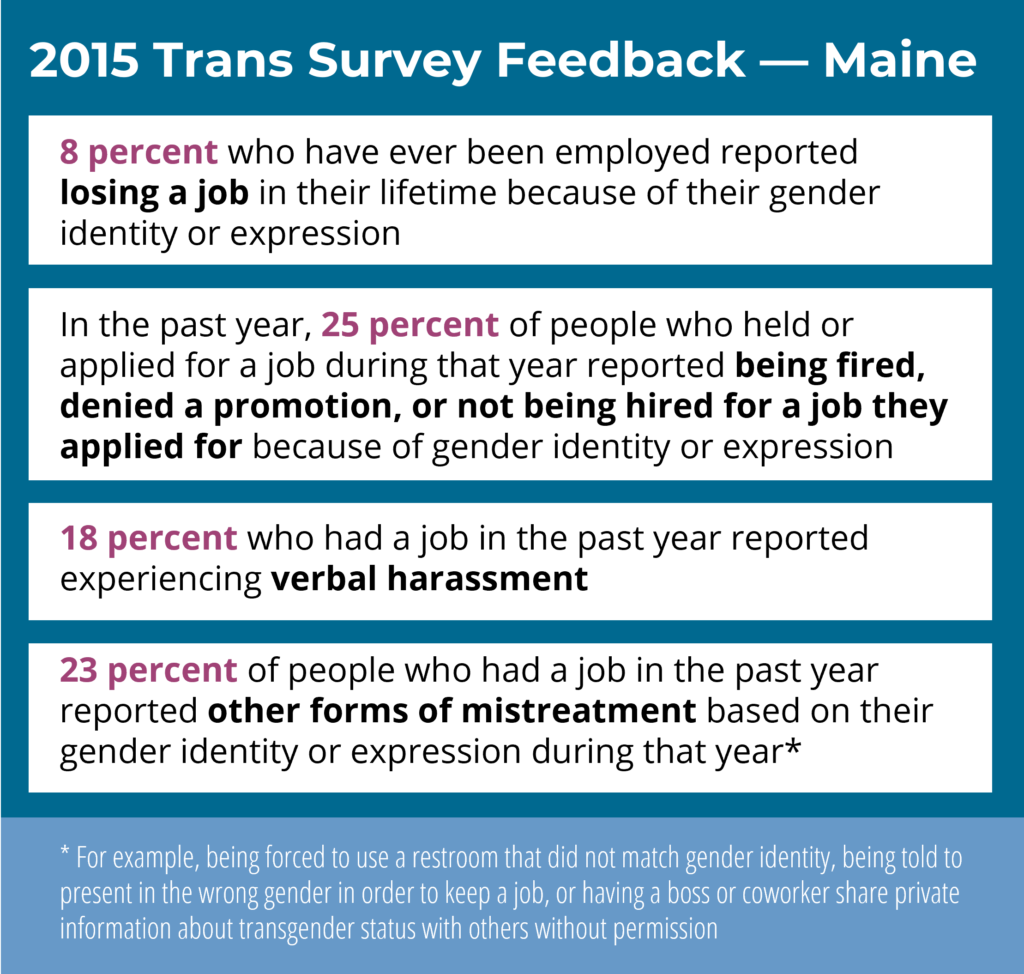All Mainers benefit when the best information is available to develop policy solutions that address discrimination and inequities in the state. Unfortunately, despite widespread recognition of the discrimination transgender people face and the damage this discrimination does to the economy, specific data about the transgender community in Maine is sparse. Policymakers have an opportunity to address this lack of information by supporting the collection and sharing of information about the experiences of transgender Mainers — such as through the upcoming U.S. Trans Survey. Doing so can help close knowledge gaps and ensure state policies address the needs of all Mainers.
In the absence of ongoing support for information gathering, a lack of data on Maine’s transgender community will continue to hinder the ability of advocates to communicate the needs of the community to people with the power to enact policy solutions. For example, it’s no secret that transgender people are at greater risk of violence and harassment. However, without data to illustrate these facts it’s difficult for advocates to show policymakers that this mistreatment is severe and widespread and not limited to the isolated experiences of a few individuals.
Comprehensive data can also inform where policymakers should direct resources and attention when attempting to ensure transgender Mainers enjoy the same quality of life as their cisgender (that is, not transgender) counterparts. For example, if data show persistent and widespread disparities in health and wellbeing or access to health care, legislators will know to pursue policies that increase transgender people’s access to quality, medically necessary health care.
It is important to note that gathering data in and of itself will not directly solve any of the disparities resulting from anti-transgender discrimination. However, gathering and publicizing data about the lived experiences of transgender Mainers will give policymakers the tools they need to better understand these disparities and take action to address them.
The national U.S. Trans Survey, due to launch later this year, is a valuable source of state-level data on Maine’s transgender community. To equip advocates and policymakers with the best information possible, government agencies and community organizations should publicize the survey to ensure it reaches the most transgender Mainers as possible.
U.S. Trans Survey is crucial because state-level data on the transgender community is sparse
While data collection efforts on state and national LGBTQ communities have increased in recent years, information on Maine’s LGBTQ population remains limited. For the Maine transgender community specifically, there have been just a few key sources of information in the past decade.
The 2015 U.S. Trans Survey is the most comprehensive look at the state and national transgender community to date, measuring discrimination in the workforce, educational settings, public spaces, and more. Additionally, a recently released report from the Williams Institute — a national-level LGBTQ+ research and advocacy group — estimated there are approximately 5,900 adults and 1,200 youth in Maine who identify as transgender. Some Maine agencies also gather data on the state’s transgender population, such as through the biennial Maine Integrated Youth Health Survey, allowing a better understanding the experiences of transgender children in schools.
Despite the useful and necessary information these data sources provide, the resources from the Williams Institute and Maine state agencies leave many questions unanswered about Maine’s transgender population, including:
- To what degree are transgender people discriminated against in the workplace? How does this discrimination impact their ability to provide for themselves or their families?
- Do transgender Mainers experience worse health outcomes relative to cisgender Mainers, as seen in national data?
- Are transgender Mainers more likely to be victims of violent crimes compared to cisgender Mainers, as is the case nationally?
These are the kinds of questions that are important to the lives of transgender Mainers and the policymakers who advocate for them — and the kinds of questions the U.S. Trans Survey is designed to answer.
2015 U.S. Trans Survey demonstrated how discrimination hurts transgender Mainers’ ability to participate equally in the economy and society
The 2015 U.S. Trans Survey was vital to helping policymakers understand the experiences of transgender Mainers — so vital, it’s still being cited by Maine media outlets in 2022. Among the wealth of information included in the survey, the Maine report shows that, in 2015, transgender Mainers experienced severe discrimination hurting their ability to participate equally in the workforce. Many transgender Mainers reported losing a job, being denied a promotion, or simply not being hired because they were transgender. When at work, a significant minority of transgender Mainers also reported general mistreatment — such as intentional misgendering or being forced to hide their transgender status — as well as verbal harassment. No one should be denied work or forced into a hostile working environment because of who they are, but for too many transgender Mainers, this is the reality they faced when attempting to provide for themselves and their families.
Unsurprisingly, economic discrimination and hostile work environments make it difficult for some transgender Mainers to stay financially stable. As a result, the transgender community experiences disproportionate rates of poverty and unemployment. In the 2015 U.S. Trans Survey, one in ten Maine respondents reported being unemployed, compared to Maine’s average unemployment rate of 4.4 percent (or, fewer than one in twenty Mainers) for that year. One in four transgender Mainers reported living in poverty, compared to approximately one in seven of the general Maine population. Transgender Mainers experienced economic hardships at rates over twice as high as that of the general Maine population in 2015. This significant disparity indicates economic discrimination played a powerful role in preventing transgender Mainers from reaching their full potential, providing for themselves, and enjoying the same quality of life as cisgender Mainers.
The experiences of transgender Mainers have likely changed since 2015. Although it is far from universal, acceptance of transgender people has been growing nationally. At the same time, the national transgender community is experiencing assaults from state legislatures across the country. How these two factors influence the discrimination experienced by transgender Mainers remains uncertain, an uncertainty that highlights the importance of the 2022 U.S. Trans Survey. Understanding how transgender Mainers’ experiences of discrimination have changed over time will inform policymakers what work remains to be done to guarantee social and economic justice for Maine’s transgender community.
Publicizing the U.S. Trans Survey is critical to ensuring advocates have up-to-date information on Maine transgender community
To ensure policymakers have the best information possible, Maine state agencies, local governments, and community organizations should inform the public about the upcoming survey and encourage transgender Mainers to participate. A specific focus should be ensuring the survey reaches transgender Mainers of color and Mainers with disabilities, as these people may be harder to reach yet likely experience more severe discrimination in some aspects relative to white transgender Mainers or transgender Mainers without disabilities.
Data is a vital tool to understanding the world around us and the problems our communities face. The upcoming U.S. Trans Survey represents a long-overdue source of information concerning Maine’s transgender community. Encouraging maximum participation will help advocates and policymakers enact policies that enable transgender Mainers to achieve their full potential, unburdened by widespread discrimination, while making Maine’s economy more resilient in the process.





